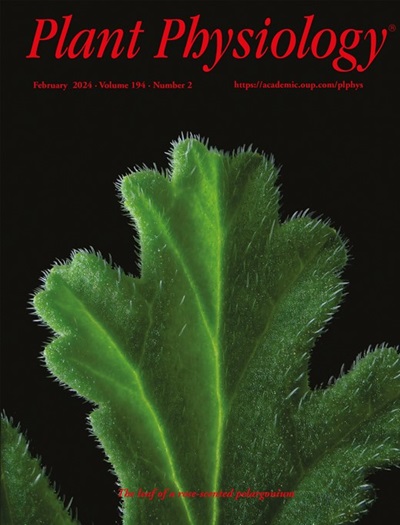The CsWRKY50-CsREM1-CsTSⅠ module inhibits theanine biosynthesis in tea plants under drought stress.
IF 6.9
1区 生物学
Q1 PLANT SCIENCES
引用次数: 0
Abstract
Drought affects theanine biosynthesis in tea (Camellia sinensis L.) plants, but how drought stress affects the associated regulatory mechanisms remains unclear. Here, we explored the molecular regulatory network governing theanine biosynthesis under drought stress. Prolonged drought stress significantly reduced theanine content and the expression of Camellia sinensis theanine synthase Ⅰ (CsTSⅠ) in tea plant leaves. We employed yeast one-hybrid (Y1H) screening using the CsTSⅠ promoter as bait to identify transcription factors regulating CsTSⅠ transcription. Analysis of the drought stress transcriptome facilitated identification of the transcription factor Camellia sinensis REPRODUCTIVE MERISTEM 1 (CsREM1), whose encoding gene had FPKM values significantly correlated with theanine content and CsTSⅠ expression. Further experiments confirmed that CsREM1 can directly bind to the promoter region of CsTSⅠ, thereby positively regulating its transcription and enhancing theanine biosynthesis. To investigate the molecular mechanisms by which drought conditions inhibit theanine biosynthesis, we employed Weighted Gene Co-expression Network Analysis (WGCNA) and identified the transcription factor CsWRKY50. Our findings indicate that as the duration of drought stress increases, CsWRKY50 expression is upregulated. CsWRKY50 directly interacts with the promoter region of CsREM1, negatively regulating its transcription and, consequently, its effect on CsTSI. Ultimately, downregulation of CsTSⅠ transcription leads to diminished theanine biosynthesis. Overall, our findings indicate that the CsWRKY50-CsREM1-CsTSⅠ module is crucial for regulating theanine biosynthesis under drought stress.CsWRKY50-CsREM1-CsTSⅠ模块抑制干旱胁迫下茶树的茶氨酸生物合成。
干旱影响茶氨酸的生物合成,但干旱胁迫如何影响相关的调节机制尚不清楚。在此,我们探索了干旱胁迫下茶氨酸生物合成的分子调控网络。长期干旱胁迫显著降低茶树茶氨酸含量和茶氨酸合成酶Ⅰ(CsTSⅠ)的表达。我们采用酵母单杂交(Y1H)筛选,以CsTSⅠ启动子为诱饵,鉴定调节CsTSⅠ转录的转录因子。干旱胁迫转录组分析有助于鉴定转录因子Camellia sinensis REPRODUCTIVE MERISTEM 1 (CsREM1),其编码基因FPKM值与茶氨酸含量和CsTSⅠ表达显著相关。进一步实验证实,CsREM1可以直接结合CsTSⅠ的启动子区域,从而正向调节其转录,促进茶氨酸的生物合成。为了研究干旱条件抑制茶氨酸生物合成的分子机制,我们利用加权基因共表达网络分析(WGCNA)鉴定了转录因子CsWRKY50。我们的研究结果表明,随着干旱胁迫持续时间的增加,CsWRKY50表达上调。CsWRKY50直接与CsREM1的启动子区相互作用,负调控其转录,从而影响其对CsTSI的作用。最终,CsTSⅠ转录下调导致茶氨酸生物合成减少。总之,我们的研究结果表明CsWRKY50-CsREM1-CsTSⅠ模块对干旱胁迫下茶氨酸生物合成的调节至关重要。
本文章由计算机程序翻译,如有差异,请以英文原文为准。
求助全文
约1分钟内获得全文
求助全文
来源期刊

Plant Physiology
生物-植物科学
CiteScore
12.20
自引率
5.40%
发文量
535
审稿时长
2.3 months
期刊介绍:
Plant Physiology® is a distinguished and highly respected journal with a rich history dating back to its establishment in 1926. It stands as a leading international publication in the field of plant biology, covering a comprehensive range of topics from the molecular and structural aspects of plant life to systems biology and ecophysiology. Recognized as the most highly cited journal in plant sciences, Plant Physiology® is a testament to its commitment to excellence and the dissemination of groundbreaking research.
As the official publication of the American Society of Plant Biologists, Plant Physiology® upholds rigorous peer-review standards, ensuring that the scientific community receives the highest quality research. The journal releases 12 issues annually, providing a steady stream of new findings and insights to its readership.
 求助内容:
求助内容: 应助结果提醒方式:
应助结果提醒方式:


